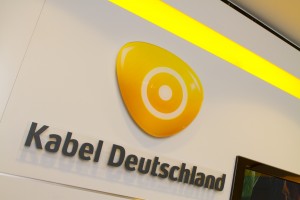
After more than 40 years of operation, DTVE is closing its doors and our website will no longer be updated daily. Thank you for all of your support.
German cable and pubcasters still at loggerheads over retrans fees
 No agreement is in sight between Germany’s biggest cable operators and the country’s public broadcasters over the latter’s refusal to pay retransmission fees for their services.
No agreement is in sight between Germany’s biggest cable operators and the country’s public broadcasters over the latter’s refusal to pay retransmission fees for their services.
“We seriously believe that our legal position is correct and we are willing to defend it at all levels,” said Kabel Deutschland CEO Adrian von Hammerstein, speaking on the opening panel at ANGA COM this morning.
“Must carry, must pay,” said von Hammerstein. “In Germany we have a unique situation where the public broadcasters make very good programmes but there are 22 public broadcasters.” Must carry rules mean huge capacity demands on cable, he said.
Von Hammerstein said that the fee to subscribers in Germany was “remarkably low” compared to other European countries. “The transmission model we have for free TV is a proven model and we shouldn’t jeopardise that,” he said.
He added he was nevertheless “optimistic” that the broadcasters and operators together would find a solution.
Liberty Global president and CEO Mike Fries, speaking on the same panel, said that German consumers paid €8.5 billion to public broadcasters and the dispute was over the relatively small sum of €50 million. He said cable delivers to half of German households and is innovating at “a pace that far exceeds [pubcasters’] innovation”. He said it was “short-sighted” of the broadcasters to argue over such a relatively small sum.
Dietmar Schickel, COO, Tele Columbus Group, said Germany’s smaller cable operators did not receive feed-in fees and had launched lawsuits two years ago because of this discrimination. He said a financial contribution from pubcasters would help the smaller operators against larger competitors. Schickel said he believed the smaller operators had a strong legal case to pursue. “We had a [court] decision in Hamburg, but the decision is not yet complete. I think it will be clarified,” he said.
Speaking for the other side, Andreas Bereczky, director, production, ZDF, said the public broadcasters were willing to negotiate and that the decision to switch off the signal to cable some months ago “did not come out of the blue”.
Karola Wille, chairwoman, Mitteldeutscher Rundfunk, said public broadcasters needed equal opportunities. She said the courts had said there was no legal right to feed-in fees.
Conrad Albert, executive legal, distribution and regulatory affairs for commercial broadcaster ProSiebenSat1said private broadcasters still paid feed-in fees to the big three operators and public broadcasters were currently not paying anything, which was not fair.
Albert said commercial players said that in the German market average media spend was EUR20 less than the European standard. Cable operators are paid twice – by the content providers and by the subscribers – but subscribers were paying a lot less than they did in other markets. He said a change would mean a wider adjustment to “international standards”.


